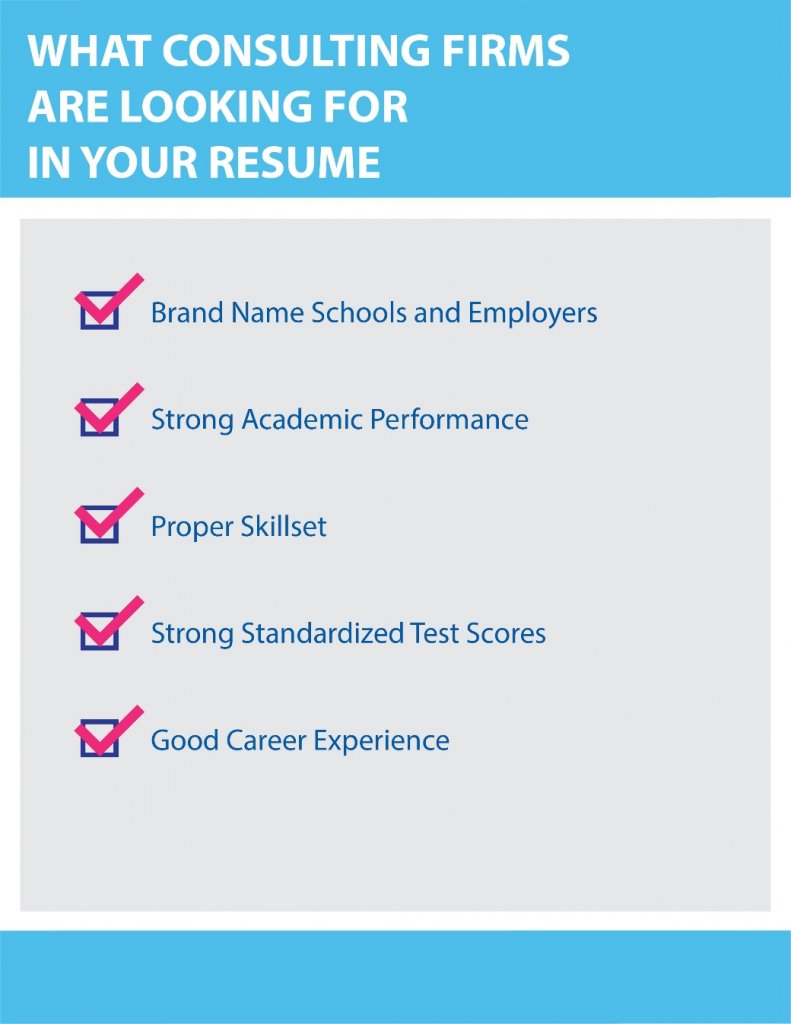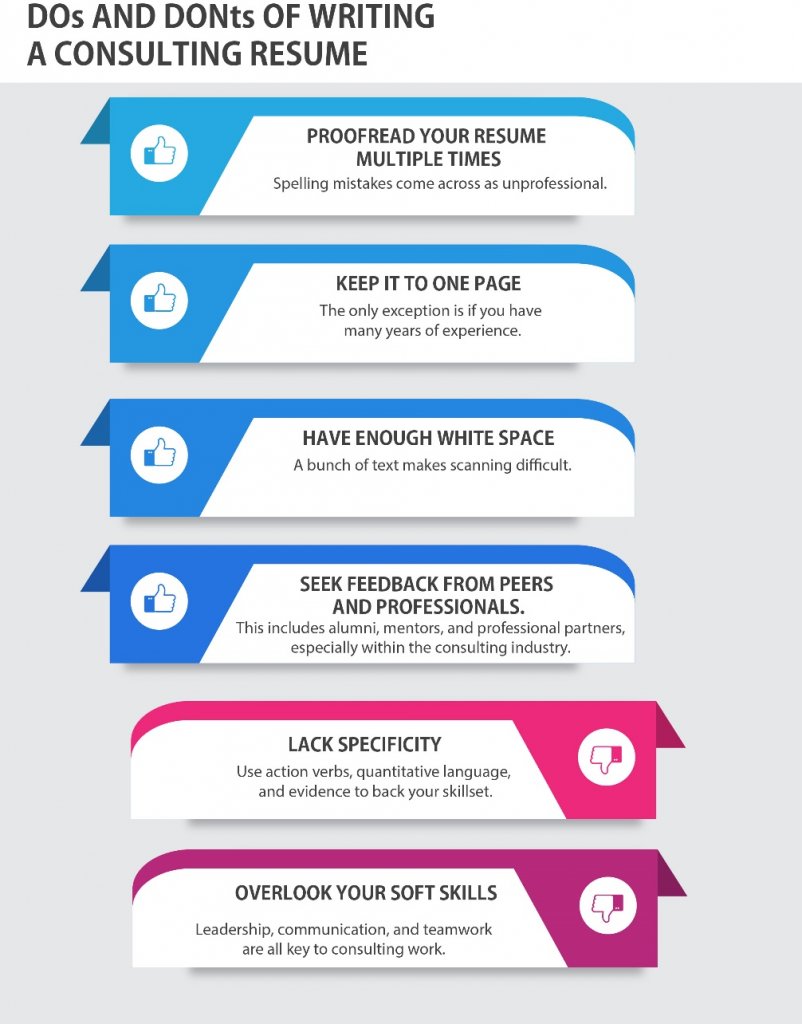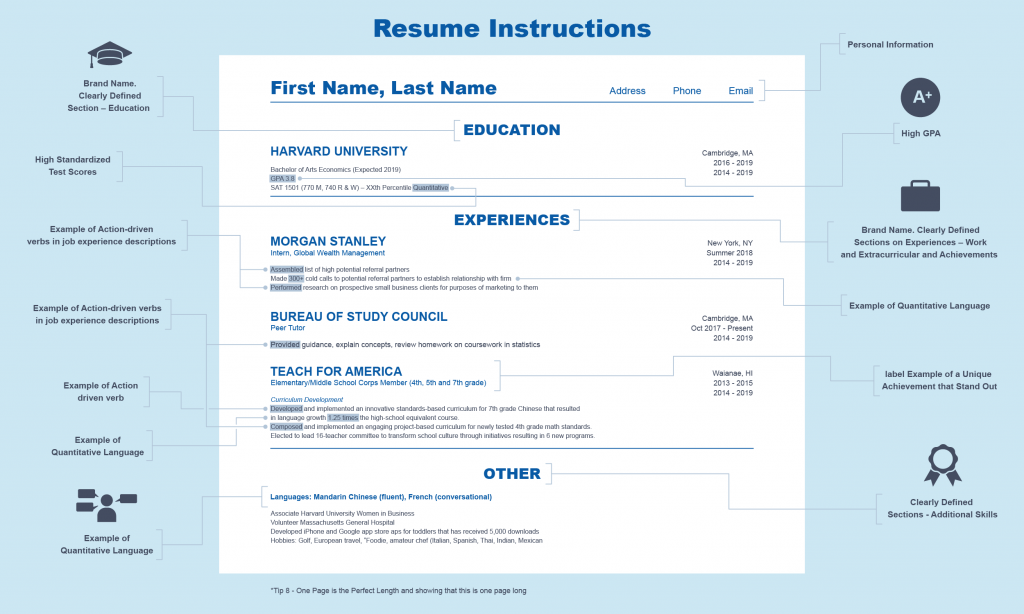For almost any professional job, applicants are required to provide a resume and cover letter to demonstrate their qualifications. Your resume is one of the most important documents during the application process, as it acts as a summary of your education, experience, and skillset.
In the consulting world, your resume is even more important. The top three consulting firms — McKinsey, Bain, and BCG — have acceptance rates of less than five percent during any given year. The resume screening step is where most applicants are eliminated. This goes to show just how important it is to write a strong consulting resume when applying to be a consultant.
FREE Resume Tips Email and Video Series
This form collects your name and email so that we can add you to our email list that delivers the free resources you are requesting. Check out our privacy policy for details on how we protect and manage your submitted data.
We’ll never spam you or share your email. Unsubscribe at any time.
A management consulting resume is different from your standard resume. The difference is not just in terms of format, but content, style, and overall approach. You probably know that the role of a consultant encompasses many different skillsets. A management consultant is a problem-solver, a data expert, and a communications professional, all bundled into one. Because consultants handle complex tasks using many different approaches, firms will be looking at your resume to determine if you have what it takes to be a successful hire. So, what goes into writing the perfect consulting resume? This piece will cover four essential guidelines that you should follow when preparing your resume for a consulting opportunity. By following these steps, you will be in a much better position to impress your employer and secure an interview.
1. Understand What Consulting Firms Are Looking for in Your Resume
In order to write a resume that will get you the interview, you must understand what top consulting firms look for when reviewing candidate applications.

These top firms care less about the proper format than they do about the qualifications and accomplishments that each candidate has. During resume screening, top consulting firms will pay attention to the following components of your resume:
- Brand Name Schools and Employers
The truth is that top consulting firms do care about which schools you attended and which employers you’ve worked for. They have a strong bias for brand name schools and employers that stand out to them and their clients. In fact, it’s the attention that the clients of the firm give to brand name schools that cause the interviewer to pay the same attention to your education background.
It’s not uncommon for a client seeking consulting services to be charged over $500,000 a year. As you would expect, such clients would want to ensure that any consultants working on their project are adequately qualified. Boasting a BS from Yale or an MBA from Harvard certainly adds points, even as a junior consultant working on a major project.
This doesn’t mean that you can’t get a consulting position if you went to a non-target school. However, if you have such brand names on your resume, make it easy for people to see.
- Academic Performance
Consulting firms also pay attention to academic performance. They want to know how you rank in your class and whether you have what it takes to tackle complex consulting projects. Therefore, include your GPA to differentiate your resume from others.
MBA applicants should include their GMAT scores and MBA GPA to be easily seen on their resume.
- Specific Skills Relevant to the Profession
Top consulting firms want to know that you have soft skills, including leadership and communication. While working in the profession, you will need to be able to handle difficult personalities, lead a team, and communicate important information in a manner that people can easily understand. Therefore, make sure you list experiences that demonstrate any leadership and communication experience, among other essential skills.
Activities that demonstrate such skills include job and internship responsibilities, extracurricular activities, and specific experiences that speak to these skills.
- Standardized Test Scores (Especially in Math)
Because grading can vary from one institution to another, top consulting firms would like to see your performance in standardized testing. High performance further strengthens your academic qualifications and shows consulting firms that you have what it takes to be a successful hire. Make sure you include high SATs, GRE, GMAT, MCAT, or LSAT scores in your resume.
- Career Experiences
Consulting firms want to see your career experiences, accompanied by what you achieved during your time in each position. Remember that these firms compare how long your career was with how much you achieved. You may need to show more accomplishments after working for eight years compared to one year.
Regardless of the number of years in a position, follow an achievement-based approach when describing your job. This means emphasizing outcomes, quantifying them, and highlighting parts of your job that apply most specifically to the consulting position in question
2. Properly Format Your Resume
Knowing what top consulting firms expect from your resume, is just the beginning of resume writing. While it does form a solid foundation to build upon, you should also know how to present your academic, professional, and extracurricular skills in a consulting resume.
A lot of this comes down to proper formatting. And by formatting, I don’t mean margins, font size, and columns. Rather, proper formatting refers to presenting your qualifications in a manner that the resume screener can easily identify.
Here are key points to remember when formatting your resume.
- Emphasize Brand Names
Make sure the brand name schools you attended, or big companies that you interned with, are clearly mentioned near the top of your resume. Have them in a bold font right after the name and contact information section.
- Proudly Display a High GPA
Along with brand names, include your high GPA right next to the school and program information. Remember that resume screeners are doing just that: screening your resume. If you make your distinguishing qualifications hard to find, you may be overlooked.
- One Page Does the Trick
This is perhaps the biggest caveat to consulting resume writing. How do you condense so many experiences and qualifications into just one page?
Starting early is key. Take time to reflect on your most relevant experiences, how you’ll allocate bullet points, and how you can play around with margins and line spacing to fit everything on one page. While this may sound challenging, it’s possible — unless you have many years of experience across multiple fields (which you can extend to a second page).
- Have Clearly Defined Sections
A typical consulting resume should be split into five clearly defined sections:
- Personal Information
- Education
- Work Experience
- Extracurricular Experiences and Achievements
- Additional Skills
While you don’t have to follow this format religiously, make sure the information you include covers all sections mentioned above. More importantly, don’t forget about your extracurricular achievements. This section gives you the opportunity to demonstrate important skills such as leadership, teamwork, and entrepreneurship.
- Use Action-Driven Verbs
When your resume is being screened, you have only seconds to attract the attention of your resume screener. So, it is essential that you give some thought to word choice. Start each bullet point with an action verb such as “lead,”“initiated,”“solved,”“saved,” etc. This will attract attention to your specific achievements and make you stand out from other applicants.
- Emphasize Language Skills
If you can speak multiple languages, you may stand out to consulting firms. A firm may view you as an asset for a specific market they’re targeting. Because consultancy is becoming global in today’s world, being fluent in more than one language can set you apart from other applicants.
- Keep It Simple
Remember that not all resume screeners are familiar with your specific field of work. Therefore, avoid industry-specific jargon when describing your accomplishments. Simplify this information in a manner that anyone can easily understand when reading through your resume.
- Demonstrate a Variety of Skills
Avoid falling victim to writing an incomplete resume. How could this happen? If you’ve been working as an engineer for many different companies, don’t include the same job responsibilities repeatedly throughout your resume. Instead, highlight unique experiences that demonstrate your diverse skillset. More importantly, emphasize your achievements rather than your daily responsibilities.
- Use Quantitative Language
The consulting field is driven by data. Numbers, quantities, and other similar information can attract attention to your skillset. As you outline achievements in your professional career, present them using quantified data backed by numbers.
For example, you could state how you developed a quality management system that resulted in lower production costs, from $40 per unit to $30 per unit (or something similar).
3. Stand Out from the Crowd
As you write a consulting resume, remember that you’re looking for any opportunity to stand out from thousands of other applicants. Similarly, resume screeners are looking for what makes you different.
Personal accomplishments such as distinguished scholarships, Olympic medals, or presidential honors can be the accomplishment that sets you apart from another similarly qualified candidate.
If you’ve done smaller, yet unique activities that others haven’t done, also include these in your resume. The goal is to take every opportunity to stand out from the competition.
4. Avoid Making Simple Mistakes
As you finalize your consulting resume, make sure you keep the following Dos and Don’ts in mind. These pointers can help you avoid common, easy-to-prevent mistakes so that you can submit an outstanding resume.
- DO: Proofread your resume multiple times.Spelling mistakes come across as unprofessional.
- DO: Keep it to one page. The only exception is if you have many years of experience.
- DO: Have enough white space.A bunch of text makes scanning difficult.
- DO: Seek feedback from peers and professionals.This includes alumni, mentors, and professional partners, especially within the consulting industry.
- DON’T: Lack specificity.Use action verbs, quantitative language, and evidence to back your skillset.
- DON’T: Overlook your soft skills.Leadership, communication, and teamwork are all key to consulting work.

As you can see from these tips, writing a consulting resume is different from a standard resume for other types of jobs. A consulting resume requires attention to detail, focus on your unique skillset, succinct language, and an achievement-based approach. Writing the perfect consulting resume is not as easy as many people think. It takes lots of time and attention.
Resume Example
Here is an example resume that highlights the tips I’ve mentioned. Reference this example as you create your resume to make sure that you hit all of the important sections. With the exception of your brand name schools/employers and GPA, these items do not need to appear in the order I have them listed. But, make sure that they are all represented in your resume.
Below is an example consulting resume. You can also download the example by clicking here.

More Resources:
FREE Resume Tips Email and Video Series
This form collects your name and email so that we can add you to our email list that delivers the free resources you are requesting. Check out our privacy policy for details on how we protect and manager your submitted data.
We’ll never spam you or share your email. Unsubscribe at any time.




127 thoughts on “Consulting Resume – The Ultimate Guide on How to Write the Perfect Consulting Resume”
Victor,
Thank you for the helpful advice. I have sent an online application to Deloitte for their NextGen Leaders program and their minimum GPA requirement is a 3.2 according to their website. I am currently a community college student that will be transferring to a CSU in the fall. I’m anticipating a 3.4 overall GPA at the time of transfer. Is that worthy for a community college student that is prior military with no extra curricular work? Any advice or recommendations to help myself stand out? Thank you.
Matthew
Oh also sorry I forgot to mention I’m an undergraduate not an MBA student. Thanks!
Alyssa
Hi victor, I have an upcoming interview at Bain for a summer associate intern position but I’m struggling to find the appropriate review and prep materials. Do you think case in point would be a good place to start? Or is it a bit advanced for a summer intern interview? Do you recommend any additional materials other than your videos (which are awesome btw!!) but I’m just stressing and want to be as prepared as possible. Thanks!!
Alyssa,
There is very little difference between undergrad intern and MBA level case interviews. The standard is high mainly because clients demand it regardless of whether a consultant is an intent, and undergrad, or a MBA. Logic is logic. Math is math. Accurate conclusions are accurate conclusions.
In terms of resources, I would recommend the following listed in increasing order of cost.
My free videos and email newsletter
My book Case Interview Secrets http://www.CaseInterviewSecrets.com
My Look Over My Shoulder Program – recordings and analysis of 20 case interviews with actual candidates https://www.caseinterview.com/loms
Doing 1:1 practice with a case coach (a former Bain, BCG or McKinsey interviewer) http://www.CaseInterviewCoach.com
In addition I would recommend up to 50 practice interviews with a practice partner. If you don’t have one locally you can search for one at http://www.caseinterviewpartner.com
I would recommend practicing with partners after LOMS and before using case coaching.
Good luck,
Victor
Also if you do well in your interview (that is if you got an interview through an employee) and your grades aren’t top notch, say maybe a ~3.4-3.5 can you still secure a job at one of the three (MBB)?
Yes absolutely. I had a 3.5 GPA coming out of Stanford. I would really try to get or keep your GPA at 3.5 or higher.
It also depends on the selectivity of your school. So a person with a 3.5 GPA from an ivy would get looked at and could get in if they did well on the case. Someone from a top 200 university would be expected to have a higher GPA to compensate for lack of ivy. The same is true if the major is not technical or math oriented. An English major is expected to have a higher GPA than an engineer because the bias in consulting is that math oriented majors are harder than the liberal arts oriented one.
Victor
Hey Victor, thanks for letting me know. What books do you recommend for case interviews? Or any tools that would help with acing case interviews? Thanks.
Lea
I’m a bit biased on this one. I recommend my own book Case Interview Secrets. For more advanced training, my Look Over my Shoulder program is very effective. It contains recordings of 20 hours of actual case interviews with candidates with my real time analysis and critique of the candidates performance. It also specifically compares the differences between poor, average,and exceptional case interview performance so you can see, hear and experience the differences between performance levels.
Victor
Do you think regardless of your grades a referral/recommendation from a top employee within the firm can still get you a job within the company?
No. It might be possible to get a case interview opportunity based solely on the relationship, but absolutely impossible to get the job offer at the top few firms without doing well on the case. From the firm’s point of view, there is ENORMOUS risk in putting someone without certain skills in front of a client. The fear is that one mis-hire could ruin the reputation of the entire firm by saying something really “stupid” (e.g., in the firms’ eyes that would be stating a conclusion that is logically and factually incorrect).
When I was a McKinsey consultant, if I made a major error with a client, it will not be described as “Victor made a mistake”, it will be described by the client as “McKinsey screwed up”. THAT is why the firms are so intensely focused on the case interview. That are totally paranoid about the scenario I just described.
-Victor
Hi Victor,
I am a mech engineer with a Masters from a top 15 school in the US and a bachelors from a top 10 (non-IIT) school in India. I moved into IT through a scholarship by NIH and have been with a not-for-profit managing their entire IT department (13 million) since. I’ve been admitted in SBS (Oxford) for a MBA. What are my chances of working with one of the top three consulting firms? Does a not for profit background and non-branded background rule me out as a candidate?
Thank you
Deepti
Deepti,
The non profit background does not rule you out. The lack of brand is an issue, but can be compensated for. Oxford is a target school so that is going to be of enormous help for you.
The lack of brand employers can be compensated in few different ways. If your prior work achievements were exceptional, that will help. Your performance at Oxford will be heavily scrutinized. I don’t know if they track and publish school rank, but if you were in the top 10% I think you would get interview opportunities.
The final compensatory factor would be to network, meet people in the firms you want to target, and get them to recommend to their recruiting departments to interview you.
The above maximizes your chances of getting the interview. Then you have to perform exceptionally well on the case. It can not just be an marginally acceptable performance (which someone with a stronger background might be able to get away with in the first round), in your case it really needs to be exceptional starting in round 1 to offset the perceived risk of hiring someone without a brand employer background.
From an interviewers point of view, it is extremely, extremely difficult to turn down a candidate in round 1 who did exceptionally well. It is VERY hard to do that. If there is a resume issue, the thinking most interviews will do is they will struggle with the decision, and then decide to pass the decision to the round 2 interviewers.
Victor
Deepti,
I should point out I have received many emails from people with backgrounds with a perceived negative item or two (some much “worse” than yours). They have gotten into the top firms. BUT, and I can’t stress this enough, they were EXTREMELY motivated and probably put 100 – 200 (the highest I’ve ever seen is 300 hours) hours into case prep and several hundred hours into networking. It can be done, but the “worse” the resume (and I don’t consider your resume bad, the Oxford piece is quite the accomplishment but the lack of brand employers is a valid issue in the eyes of consulting firms) the harder you just worker AND very importantly the EARLIER you must start. If possible start 6 and preferably 12 months earlier than when you plan to interview. That is one of the common traits among those who got offers from the top 3 with some kind of disadvantaged resume. Flat out, they wanted the offer badly and were willing to put in the effort.
Victor
Hi Victor,
Thank you for your reply. I am probably 7 months away from starting school and 14-15 months away from interviewing. What do you recommend I do to get started? I am a slow learner but a hard worker so what should my first step be? Is there a course I can join or should I get started with your videos?
Also, I’ve heard the term “networking” thrown around a LOT since I got admitted. Is there a good place to learn networking 101? What should I be doing now to get placed a year later?
Thanks so much. Your reply was very helpful.
Deepti
Also have you ever heard of people getting a job at a top consulting firm (MBB) with a lower GPA?
3.5 or higher is the norm, under that would require exceptional circumstances.
Thank so much for the reply victor. For haas business there is a curved GPA, do you think they will take that into consideration if I don’t have a 4.0? I think I should have a 3.75-3.8 is that ok?
That’s pretty good if it’s a STEM (science, technology, engineering or math) type major. Resumes get reviewed on the whole picture. You don’t need everything to be perfect, but if one thing is low something else on the resume needs to stand out as a compensating factor. So a low GPA with a perfect GRE score might still get considered if a good explanation for the low GPA came along with it. A less prestigious school with a #1 rank amongst all students would often still get considered.
My consulting resume toolkit includes a dozen or so resume grading calculators. You can find the link somewhere on the website, probably at the top.
If everything across the board is poor, that’s a deal breaker. If one thing is poor, but the rest exceptional that’s a possibility. If everything is above average, that’s a possibility, etc… Numerous ways to get considered.
Victor
Hey Victor, I’m an undergrad at berkeleys business school but the problem is I transferred from community college. Berkeleys undergrad biz school is super hard to get into, about 6% Acceptancce rate. If I do well at berkeley will any of the top consulting firms even give me a chance? Please feel free to be honest. Thanks
Karina,
By itself, I don’t think it is a deal killer. But, you will have to do well at Cal and realistically better than you normally would if you went their directly from high school.
My college roommate at Stanford was a community college transfer. He was a Stanford Computer Science major with a 4.0 GPA — needless to say nobody cared how he got into Stanford, only how he performed as he left.
Incidentally, the “story” you want to imply (assuming it is true) is that you went to community college to save money (which most consider an acceptable reason to go) but were qualified to attend an elite university (and your high gpa at the elite university is indicative of your ability to perform at a high level).
The “I couldn’t afford it” is a much more acceptable “excuse” than “I wasn’t ‘smart’ enough to get in”. It would help to have a super high SAT, GMAT or GRE score too.
-Victor